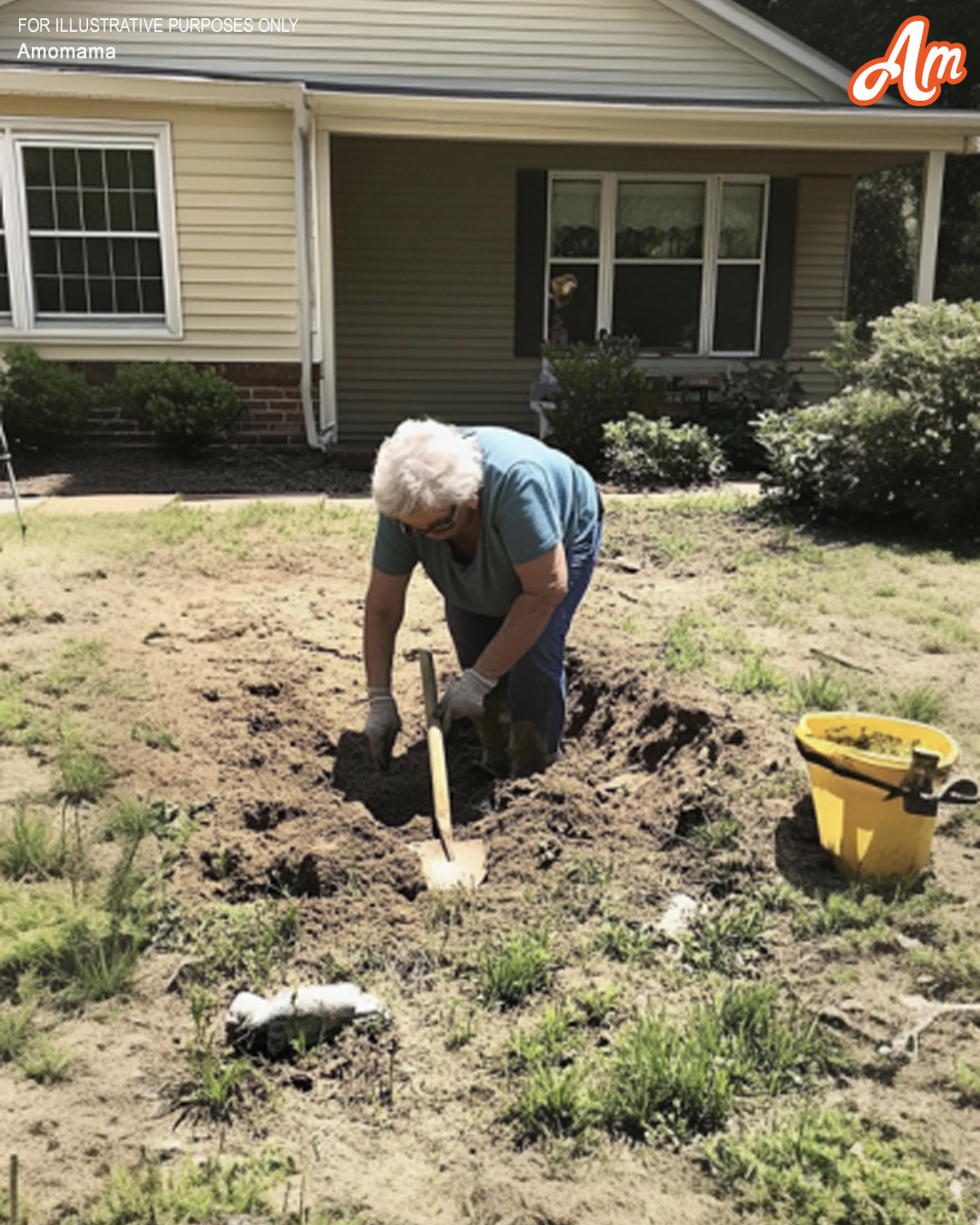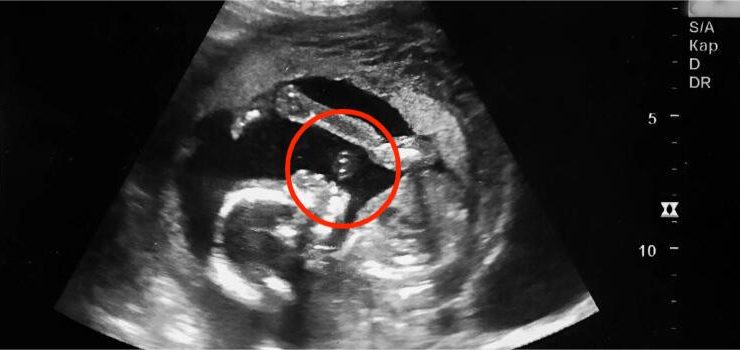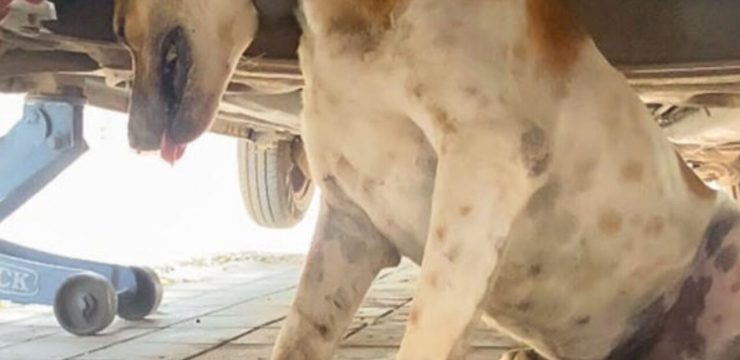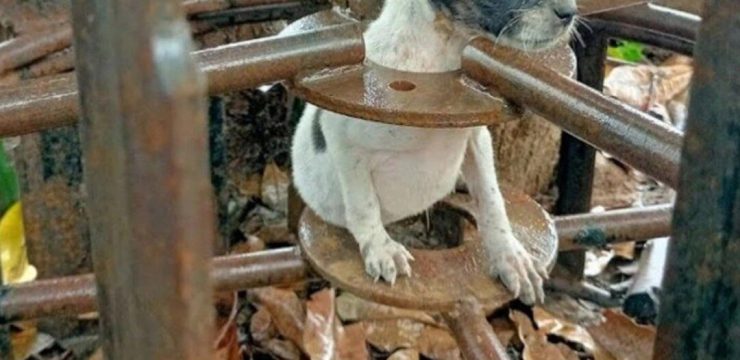It was a warm afternoon, and the golden sunlight bathed my quiet street as I folded laundry by the window. My 67-year-old neighbor, Mrs. Cartwright, was in her yard, digging with an intensity that seemed unusual. She was a petite woman, always neat in her cardigans and known for her kind smile. Despite her age and fragile health, she maintained a spirited demeanor. But today, something was different.

Her frail arms jabbed at the ground with a spade, and sweat soaked her blouse. It didn’t seem right. Concerned, I opened my window and called out, “Mrs. Cartwright! Are you okay?” She didn’t respond, her focus entirely on her task. I tried again, louder this time, “Do you need help?” Still, she ignored me, continuing her frantic work.
As I debated whether to intervene, she suddenly stopped, dropped the spade, and threw her hands in the air. “Finally!” she exclaimed, her voice carrying relief. But before I could process her words, she collapsed like a marionette with its strings cut. My heart dropped. “Mrs. Cartwright!” I yelled, bolting out the door and sprinting to her yard.
When I reached her, she lay motionless on the ground, her hand resting on the edge of a freshly dug hole. Kneeling beside her, I checked for a pulse. It was faint but there. Her breathing was shallow, but she was alive. Relief washed over me as I whispered, “Hang on, Mrs. Cartwright,” unsure if she could hear me. I adjusted her head to improve her airflow, but something in the hole caught my eye—a small, weathered wooden box protruding from the dirt.
I hesitated. Helping her was my priority, but curiosity tugged at me. What could be so important that she’d exhaust herself digging for it? Against my better judgment, I reached into the hole and pulled out the box. Its lid creaked as I opened it, revealing bundles of letters tied with faded twine, yellowed photographs, and a sealed envelope. One photograph showed a young Mrs. Cartwright smiling beside a man in uniform—her husband, I assumed. The items were old yet preserved, hinting at a significant story.
As I sifted through the contents, a groan startled me. “Mrs. Cartwright?” I asked, dropping the photo. Her eyelids fluttered open. “Where…?” she murmured, her voice raspy. “You collapsed,” I explained softly. “I’ll call for help.” But her hand shot up, gripping my arm with surprising strength. “No!” she insisted. “The box. Is it—” She coughed, struggling to sit up.
I pointed to the box. “It’s here, but you need to rest,” I urged. She ignored me, her eyes wide as she reached for it. Cradling it like a treasure, tears streamed down her cheeks. “Sixty years,” she whispered, her voice thick with emotion. “My husband buried this before he went to war. He said it was a way to keep his dreams safe. If he didn’t come back, he told me to find it.” Her voice cracked as she added, “He didn’t come back. I searched for years but thought it was lost forever.”
She explained how recent dreams of her husband had led her to dig under the tree. “I didn’t believe it at first,” she said, laughing softly through her tears. “But something told me to try.” Her determination had finally uncovered the box.
Inside the sealed envelope was a letter. She asked me to help open it, her trembling fingers unable to manage. I unfolded the fragile paper and read aloud. The letter was addressed to his family, expressing love and hope. “If you are reading this,” it began, “it means my dove has found what I left behind. Love always stays. Take care of one another. Forgive, even when it’s hard.”
Mrs. Cartwright cried as I read, her hands brushing over a small locket inside the envelope. It contained a tiny photo of her and her husband, smiling together. She held it close, whispering, “He always said this would outlast us both.”
Over the next few weeks, Mrs. Cartwright and I sorted through the letters, each one revealing her husband’s love and courage. The letters rekindled memories and emotions she hadn’t felt in years. When I suggested sharing them with her family, she hesitated. “We’ve drifted apart,” she admitted. “Arguments… regrets.” But the idea seemed to resonate.
Two weeks later, she hosted a family gathering. With my help, her living room became a warm space filled with the letters, photographs, and the locket. As her children and grandchildren arrived, the atmosphere was tense but hopeful. Mrs. Cartwright stood before them, her voice trembling but resolute. “These letters are from your grandfather,” she said. “They’re his way of reminding us what truly matters.”
As her eldest son read one aloud, the room filled with tears and laughter. The locket passed through hands, its significance felt by all. By the end of the evening, the family was talking and laughing like they hadn’t in years. Mrs. Cartwright squeezed my hand, gratitude shining in her eyes. “You brought us back together,” she said softly.
“No,” I replied. “Robert did. And you.”
That night, I walked home holding the locket, its weight a reminder of the enduring power of love and connection. What started as an ordinary day had turned into something extraordinary—a testament to the bonds that can heal even after decades of silence.





